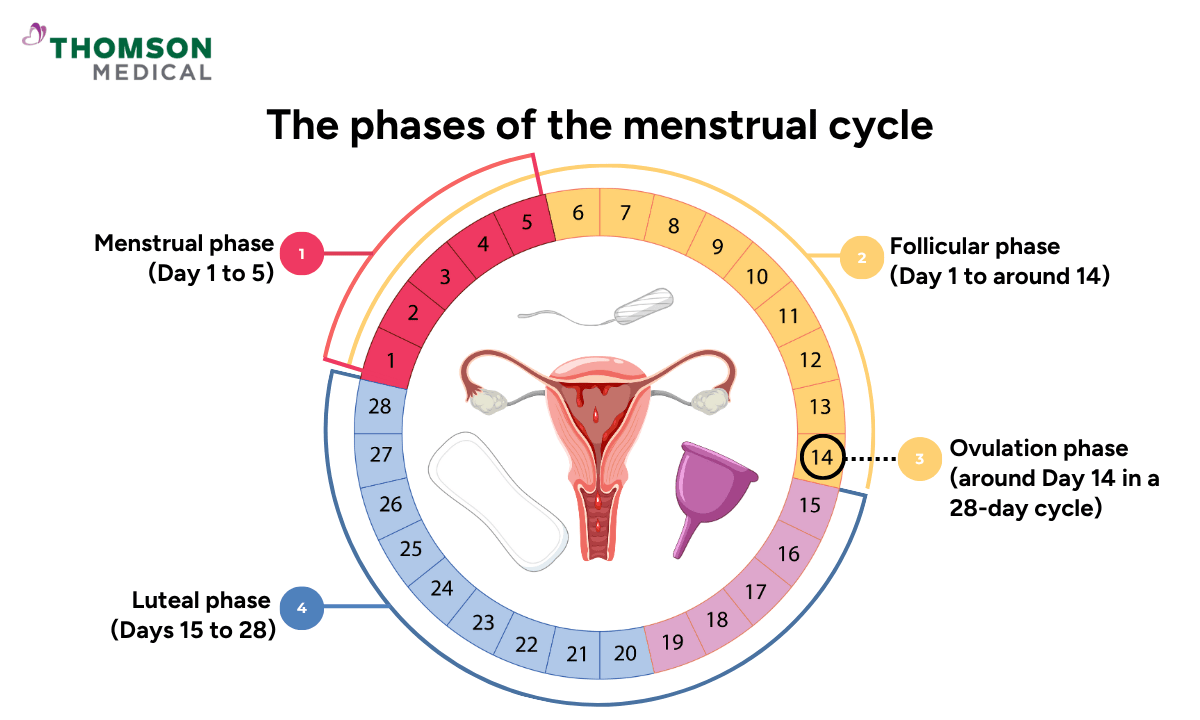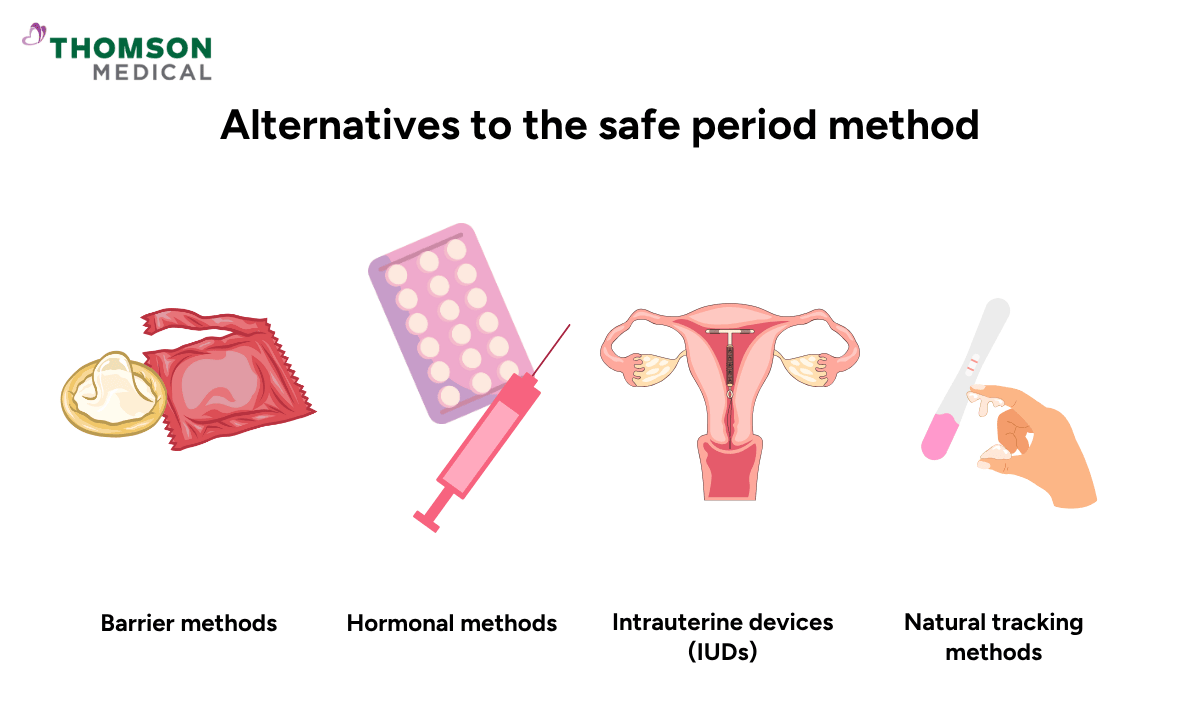You might have heard about the safe period, the days in your cycle when you're least likely to get pregnant. While the concept of avoiding intercourse when you're likely to become pregnant and doing it when it's safe may seem straightforward, it's not a guaranteed solution to avoiding pregnancy. By learning how your cycle works, you can make informed decisions about when to have sexual intercourse if you’re trying to avoid pregnancy naturally.
What is a safe period?
The safe period is when your body is least fertile, meaning the chances of getting pregnant are low. Some couples use this method to avoid pregnancy naturally, without hormonal contraceptives or medical devices.
This approach is also called the calendar rhythm method or fertility awareness method (FAM). It involves tracking your menstrual cycle to predict your fertile window (the days when you are most likely to conceive) and avoiding unprotected sexual intercourse during that time.
However, it's important to understand that the safe period method is not completely reliable. Your menstrual cycle can change due to stress, illness, or hormonal imbalance, which makes it difficult to predict ovulation accurately. For this reason, studies show that the failure rate of this method can be relatively high compared to other contraceptive methods.
What happens during your menstrual cycle?
To understand how the safe period method functions, you need to understand how your menstrual cycle works. A typical cycle lasts between 21 and 35 days, with the average being around 28 days. The cycle starts on first day of your menstruation and continues until the day before your next period begins.
What are the phases of the menstrual cycle?

Your menstrual cycle has four main phases. The timing below refers to a 28-day cycle. If your cycle is shorter or longer, the days might be different:
Menstrual phase (day 1 to 5):
The uterine lining (the inner layer of your womb) sheds, resulting in menstrual bleeding.
Follicular phase (day 1 to around day 14):
Hormones help the eggs in your ovaries grow and mature.
Ovulation phase (around day 14 in a 28-day cycle):
A mature egg is released from your ovary.
Luteal phase (day 15 to 28):
Your body prepares for pregnancy. If fertilisation does not occur, the cycle ends, and your next menstrual period begins.
How does ovulation affect fertility?
Ovulation (the release of an egg from your ovary) is the most fertile time in your cycle. The egg lives for about 12-24 hours, while the sperm can survive in your body for up to five days. That’s why the chances of pregnancy are higher if you have sexual intercourse a few days before or during ovulation.
However, each woman’s cycle is different, so the timing of ovulation can vary. It does not always happen exactly 14 days before your next menstrual period. For this reason, relying only on the calendar can be inaccurate, especially if your cycle is irregular.
Does menstrual cycle length matter?
Yes, the length of your menstrual cycle does matter. If you have shorter or longer cycles, you may ovulate earlier or later than day 14. That’s why it’s important to understand your monthly cycle if you plan to use the safe period method. Regular tracking helps you see your body’s natural pattern, such as when your menstruation starts and ends and when you are most likely to ovulate.
Our family planning specialists
Loading...
How do you calculate your safe period for intercourse?
To calculate your safe period, track your menstrual cycles for at least 6 to 12 months.
Note your shortest and longest cycles
Subtract 18 days from your shortest cycle to find your first fertile day
Subtract 11 days from your longest cycle to find your last fertile day
Avoid unprotected sexual intercourse between these two days in each cycle
For example, if your shortest cycle is 27 days and your longest is 31 days:
27 - 18 = Day 9 (first fertile day)
31 - 11 = Day 20 (last fertile day)
Based on this, you would need to avoid unprotected sexual intercourse from day 9 to day 20.
While this calculation can help guide you, it still has limitations that are important to be aware of. Your ovulation can shift from month to month due to factors like stress, illness, and hormonal changes.
If you’d like to rely on the safe period method, it’s best to confirm your cycle patterns with a doctor. Request a consultation with Thomson Medical specialist to ensure your tracking is accurate according to your menstrual cycle.
What are the pregnancy possibilities around your period?
Some women think they can’t get pregnant during menstruation, but that’s not always true. Here are the chances of pregnancy during each phase of your menstrual cycle:
Before your period:
The chance of pregnancy is low, but not zero, especially if you have an irregular menstrual cycle.
During your period:
Fertility is low, but sperm can survive inside your uterus (womb) for up to five days. If you ovulate early, pregnancy is still possible.
Right after your period:
The pregnancy risk increases because your ovulation may happen earlier than expected.
If you want to avoid pregnancy in a more reliable manner, it’s safest to use protection such as condoms or other contraceptive methods.
What are the benefits and risks of intercourse during your period?
Some women still choose to have sexual intercourse during menstruation. It is generally safe, but it's important to be aware of both the benefits and risks.
Having sexual intercourse during menstruation may help ease your cramps and menstrual discomfort. Additionally, it can also strengthen intimacy, provide natural lubrication, and reduce stress through the release of endorphins (hormones that make you feel good).
However, there is a higher risk of infections such as sexually transmitted infections (STIs), urinary tract infections (UTIs), and bacterial vaginosis. There is also a slightly higher pregnancy risk if your menstrual cycles are irregular. To keep yourself safe, always practise good hygiene and use protection to lower these risks.
What are the alternatives to the safe period method?

If you find tracking your cycle difficult or your menstrual cycles are irregular, other methods may be more reliable:
Barrier methods such as condoms or diaphragms prevent sperm from entering the uterus
Hormonal methods like pills, patches, or injections work by stopping ovulation
Intrauterine devices (IUDs) are small devices placed inside your womb to help prevent pregnancy
Permanent methods include tubal ligation for women and vasectomy for men, both designed to permanently block pregnancy
Natural tracking methods involve monitoring body temperature or using ovulation test kits to identify fertile days
Family planning with Thomson Medical
When planning your family's future, there are many things to consider, especially if you want to delay or prevent pregnancy. At Thomson Medical, our family planning specialists understand your concerns about delaying conception.
That's why our family planning services provide the support and medical expertise you need to make informed decisions about contraception. We offer personalised care tailored to your health, lifestyle, and future plans. From helping you perform fertility tracking methods to discussing hormonal options, IUDs, and permanent solutions.
There are several types of contraceptive method available, each with its own benefits and limitations. The most suitable option for you depends on factors such as how regular your cycle is, how comfortable you are with daily tracking, any health considerations you have, and whether you are planning to have children in the future.
To discuss your options and determine the most suitable method of contraception for you, request a consultation with Thomson Medical. Our specialists can recommend suitable contraceptives and provide personalised guidance on how to use them safely and effectively.
FAQ
Is the safe period 100% effective in preventing pregnancy?
No. The safe period method is not completely reliable. Its success rate depends on how regular your menstrual cycle is and how accurately you track your fertile days. Even with careful tracking, there is still a chance of pregnancy.
How many days after a period are considered safe for sexual intercourse?
For women with a regular 28-day cycle, the first 7 days after menstruation ends and the last 7 days before your next menstrual period are usually considered less fertile. This is sometimes called the “7 days before and 7 days after” method. However, it only works well if your cycle is regular. Small changes in ovulation can make this method less effective.
Can sperm really survive inside the body for several days?
Yes. Sperm can live inside a woman’s body for up to 5 days. This means that if you have sexual intercourse a few days before ovulation, the sperm may still be alive when the egg is released, making pregnancy possible even outside the predicted fertile window.
Do irregular cycles make the safe period unreliable?
Yes. If your cycle changes from month to month, you might find it difficult to predict ovulation accurately. Irregular cycles (when your menstrual period does not come at the same interval each month) can make the safe period method risky, as you might ovulate earlier or later than expected.
Does every woman have a safe period, or does it vary?
It varies. Each woman’s menstrual cycle is unique. Your safe period depends on your cycle length (how many days from one menstrual period to the next) and how regular your ovulation is. That’s why tracking your cycle regularly helps you understand your pattern better.
Which days are safest to have sexual intercourse before and after periods?
There are no completely safe days for sexual intercourse if you are not using contraception. Ovulation can sometimes shift due to stress, illness, or hormonal changes. However, for women with regular cycles, the days when you're menstruating and the few days immediately after are generally less fertile. The most fertile days are those leading up to and including ovulation, which is usually around Day 12 to Day 16 in a 28-day cycle.
The information provided is intended for general guidance only and should not be considered medical advice. For personalised recommendations and tailored advice based on your unique situations, please consult a specialist at Thomson Medical. Request an appointment with Thomson Medical today.
Reference:
Fu, H., Darroch, J. E., Haas, T., & Ranjit, N. (2022, August 25). Contraceptive Failure Rates: New estimates from the 1995 National Survey of Family Growth. Guttmacher Institute. https://www.guttmacher.org/journals/psrh/1999/03/contraceptive-failure-rates-new-estimates-1995-national-survey-family-growth
For more information, contact us:
Thomson Specialists (Women's Health)
Thomson Women's Clinic (TWC)
- Novena:
6592 6686 (Call), 8611 8986 (WA) - Bukit Batok:
6569 0668 (Call), 8686 3525 (WA) - Choa Chu Kang:
6893 1227 (Call), 8282 1796 (WA) Jurong:
6262 8588 (Call), 6262 8588 (WA)- Katong (female doctor):
6970 2272 (Call), 8611 9020 (WA) - Punggol:
6243 6843 (Call), 8811 0328 (WA) - Sembawang: 6753 5228
- Sengkang: 6388 8125
- Serangoon (female doctor): 6382 3313
- Tampines: 6857 6266
- Tiong Bahru: 6276 1525
